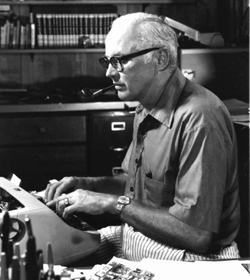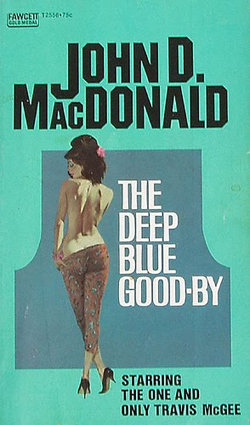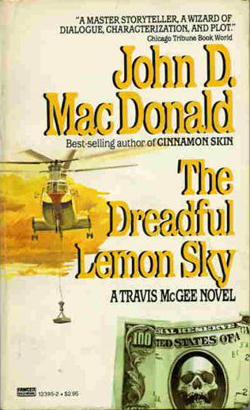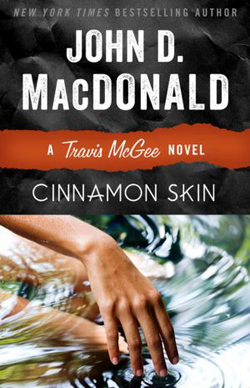
He not only won readers, he won awards: The Ben Franklin Award (1955), the Grandmaster Award from the Mystery Writers of America (1972), the American Book Award (1980). In 1983 he was Guest of Honor at Bouchercon. There were other awards and honorary academic degrees as well; plus he earned a business degree from Syracuse University and an MBA from Harvard.
Yet, for all of his prolific writing and personal accomplishments, it is for the 21 rainbow-hued Travis McGee novels that we best remember MacDonald. After all, the state of Florida didn’t designate Slip F-18 Bahia Mar, a literary landmark and post a bronze plaque on the site dedicated to “The Busted Flush,” home of Travis McGee, for nothing.

1964 The Deep Blue Good-By • 1964 Nightmare in Pink • 1964 A Purple Place for Dying • 1964 The Quick Red Fox • 1965 A Deadly Shade of Gold • 1965 Bright Orange for the Shroud 1966 Darker than Amber • 1966 One Fearful Yellow Eye • 1968 Pale Gray for Guilt • 1969 The Girl in the Plain Brown Wrapper • 1969 Dress Her in Indigo • 1970 The Long Lavender Look • 1972 A Tan and Sandy Silence • 1973 The Scarlet Ruse • 1974 The Turquoise Lament • 1975 The Dreadful Lemon Sky •1978 The Empty Copper Sea • 1980 The Green Ripper •1981 Free Fall in Crimson • 1982 Cinnamon Skin • 1985 The Lonely Silver Rain
And while every case for Travis was, to twist the old adage, a horse of a different color, they were in the final analysis, all the same for him: highly personal.
So whether he was getting involved with hot-blooded Cuban refugees and their plans to take out Castro (A Deadly Shade of Gold) or licking counterfeit stamp traders (The Scarlet Ruse) or diving for sunken treasure in the Bay of La Paz (The Turquoise Lament), McGee always did it under the banner of justice.
Of course it was his version of justice. A version he shared with the reader, so we knew exactly how and why things were this way.
“There wasn’t any other choice. Sometimes it is a relief not to have a choice.”
— The Dreadful Lemon Sky“If it turns out that there is any way to take him alive, I’d like that.”
—Free Fall in Crimson“When the cavalry went riding to rescue the wagon train, they never took the scenic route.”
—The Empty Copper Sea“Once you have made enough people sufficiently unhappy with your activities and the effect on their lives and fortunes, it is wise to live as though there is a small deadly snake in every shower stall, cyanide in the tastiest cookie.”
—The Lonely Silver Rain
 “Write what you know.” is the old axiom; and MacDonald took it to heart. While his writing has a long-term perspective, especially on time and life, his works are definitely moored in the bedrock of the decades in which they were written. So, reading MacDonald is a journey back into earlier times when technology was simpler and language less politically correct:
“Write what you know.” is the old axiom; and MacDonald took it to heart. While his writing has a long-term perspective, especially on time and life, his works are definitely moored in the bedrock of the decades in which they were written. So, reading MacDonald is a journey back into earlier times when technology was simpler and language less politically correct:
“..collapsing an SX-70 Polaroid while Sammy examined the print as it developed.”
—The Green Ripper“We often notice in clinical studies that sado-sociopathic faggots…”
—A Tan and Sandy Silence“Mod clothes and a glossy wig…”
—The Dreadful Lemon Sky“…a blur of ambient noise, of Muzak and laughter…”
—The Empty Copper Sea“Just a terrible urgency about finding and maintaining an orgasm batting average acceptable to the peer group.”
—The Deep Blue Good-by
Whatever Travis does, he does seriously. Even with the most common parts of life, one’s house and car, he pushes his iconoclasm in your face. He turns a Rolls-Royce, historically the most luxurious and expensive marque of automobiles, into a pickup truck and calls her “Miss Alice.” His houseboat, the Busted Flush, is really a floating barge. He cannot abide a martini unless it’s made with Plymouth Gin. But when they change the formula, he basically says, “Screw it, I’ll go with Boodle’s.”
And while MacDonald wrote of his times and the hot topics of the day, he was also ahead of his time. In A Deadly Shade of Gold, MacDonald warned of the drug wars, the in-your-face corruption of Florida politics, 20 years before it became a staple of prime time television a la Miami Vice. In Cinnamon Skin, he skewered his home state: “Florida was second rate, flashy and cheap, tacky and noisy.” He told about its failing water supply, the raping of the marshlands and estuaries by carpetbagger developers and their land swindles (the most recent being Victor and Natalia Wolf who bilked millions from naïve investors and then fled the United States).

Every sleuth has his own special code he lives by: “I won’t play the sap for you.” (Sam Spade). Or the one he dies by: “You just slept the big sleep, not caring about the nastiness of how you died…” (Philip Marlowe). For Travis, his code is the prism by which he sees the world: “Integrity is not a conditional word. It doesn’t blow with the wind or change with the weather.” — The Turquoise Lament.
So when he takes on a case and serves revenge, it isn’t blue and cold, but red-hot and angry: “I snatched the rifle by the barrel and swung the stock at him…It took him squarely in his thick throat…there was one long rippling, quivering, muscle-jerking spasm, and then he was still.” —The Green Ripper.
MacDonald says it best in one of the last interviews of his life, “The whole world is colored by the prejudices and ignorances of your hero.”
I don’t think MacDonald says “colored” by accident. After all, he proved it 21 times.
John Geraci is an award-winning screenwriter who recently turned his talents to fiction. He looks forward to this December and the launching of his novel Dead Man Talking—a thriller set in a Southern California beach town where the dead bodies are beginning to outnumber the tanned ones.
Read all posts by John Geraci at Criminal Element.

I enjoyed your piece on MacDonald very much. In his defense, the line about “sadio-sociopathic faggots” wasn’t uttered by McGee, but by his friend Meyer — who was trying to provoke a man (never identified in the book as gay) who held them both prisoner.
By the same token, there *are* some depictions of homosexuals, both men and women, in a few of the books which appear quite unenlightened by today’s standards — but then, that was your point, wasn’t it?
Yeah, I was going to correct you on that as well. Meyer was intentionally trying to enrage someone into losing their focus.
And in One Fearful Yellow Eye, Travis espouses some wonderfully enlightened ideas about homosexuals for the times.
No offense, but it would behoove you to give the books a second, more thourough reading as you are obviously misremembering certain things.
I read the series while coping with my husband’s first cancer (too much Agent Orange) and McGee and his code of honor and the way he took things seriously got me (got us) through. I’ve always been grateful to Mr. MacDonald for that. Yes, McGee was flawed but he seemed real and he seemed honest, at least, by his lights. Nice analysis.
In The Quick Red Fox, McGee goes on a rant about lesbians that’s truly terrifying. Then he beats them with a putter, chasing them back to their “butch colony.”
Miss Agnes, not Miss Alice, was converted during the depression and painted “a horrid shade of blue” that reminds McGee of his grade school teacher’s hair. MacDonald wrote some of the best pulp ever, and the McGee novels stand the test of time.
Just pure classic stuff from you here. I have never seen such a brilliantly written article in a long time. I am thankful to you that you produced this!